Guide to moving to Portugal in 2024
Moving to Portugal in 2024 is a popular choice for many expatriates. Many are looking for a new start in a European country for their family, or a relaxing place to retire. With over 300 days of sunshine throughout the year, it's a great choice for those looking to relax and unwind in picturesque and beautiful surroundings.
Free ConsultationAbout Portugal
Since 1139, Portugal has been a nation-state with clearly defined borders, making it the oldest nation-state in all of Europe. Portugal is a fascinating country with a rich history that can be sensed in every city; from the busy capital to the picture-perfect villages.
Portugal has been a member of the European Union since 1986 and adopted the euro in 1999. Portugal’s most famous export and its national drink is port wine. Renewable energy sources such as wind, hydro, and solar account for around 70% of the country’s total energy production. In recent years, Portugal has demonstrated that it can satisfy all of its domestic electricity needs through renewable sources, making the country a pioneer in the energy sector.
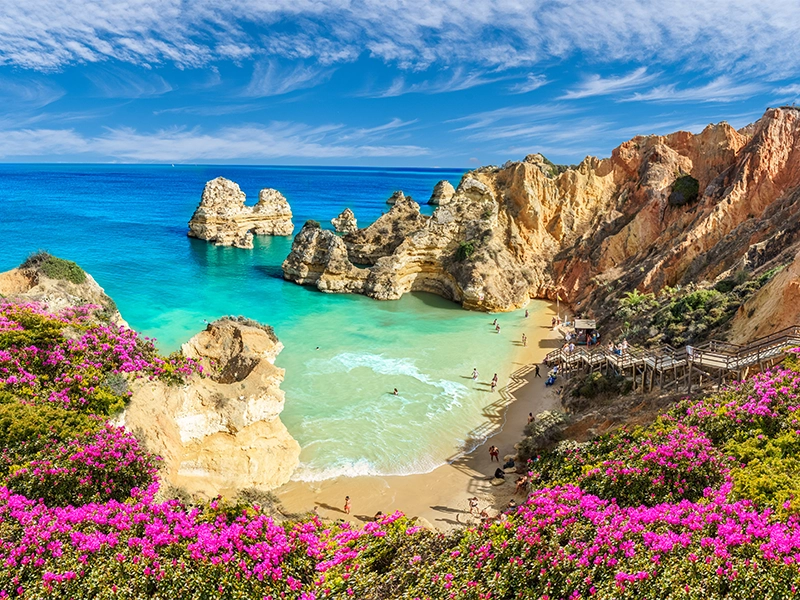
Why should you move to Portugal?
In recent years, the number of British expats relocating to Portugal has increased significantly. Portugal’s Foreigners and Borders Service (SEF) has announced that 42,071 Britons became Portuguese residents in 2021, maintaining the second greatest nationality group position for another year. The total number of UK nationals living in Portugal has reached 714,123 – a 7.8% increase over 2020 and a sixth consecutive year of growth.
It’s no wonder that Brits like moving to Portugal. The Anglo-Portuguese Alliance signed in 1373 is the world’s oldest and is still in force today. It’s also one of the safest countries in Europe and has a high standard of medical care. But it’s not only the history, cuisine, and wine of Portugal that make it an attractive place to move to; it’s the beaches, the surf opportunities, the golf courses, and the diverse landscapes that draw visitors all year round. But perhaps the most appealing aspect of the country is its people, who are known for their warmth, openness, and sincerity.
Famous beaches in Portugal
Portugal boasts almost 950 kilometres of coastline. The country has many world-famous beaches that you may have seen in magazines and across social media feeds. The Algarve region in southern Portugal is home to some of the best beaches in the country.
Camilo Beach is one of the most beautiful beaches in southern Portugal, located near the lively seaside town of Lagos in the western Algarve. Despite its proximity to some of the region’s major resorts, Praia do Camilo’s tranquil setting, and shallow, turquoise waters make it popular with snorkelers.
Guincho Beach, one of Europe’s top windsurfing and kitesurfing destinations, is located on the Lisbon coast, six kilometres northwest of the cheerful resort town of Cascais. This is an adrenaline-pumping option for serious water sports enthusiasts.
The fishing port of Nazaré, long known for its traditional character, is blessed with a fantastic beach that draws sun worshippers to this lively town in central Portugal. Sunbathers coexist on Praia da Nazaré with fishermen, who can be seen mending nets or arranging mackerel and sardines to dry on wire racks.
Taste the Portuguese cuisine
What is life without food? Portugal is one of the best destinations for people who call themselves “foodies.” Local ingredients and bold, powerful flavours are central to Portuguese cuisine. Tasting the local cuisine will make you want more!
Caldo Verde, a popular local dish, may appear to the uninitiated as cabbage soup. It is deceptively difficult to make because the greens are cut in very specific ways, absorbing much of the faint smoky flavour imparted by the addition of barbequed sausage.
More than a thousand Portuguese dishes use the simple ingredient of salted, dried cod, known as Bacalhau. Its distinct saltiness is a potentially addicting flavour that can be found in everything from roasts to casseroles to croquettes.
There are several variations on the original Portuguese dish of bifana sandwiches, but the most common ingredients are white wine, paprika, garlic, and chopped ham. In some Portuguese restaurants, the dish is topped with additional toppings such as tomatoes and a fried egg. Some say that you can find the best bifana in the capital Lisbon.



Enjoy the wines of Portugal
If you belong to a small group of people who haven’t enjoyed a glass of port wine until now, we recommend doing so at the earliest convenience! Portugal is one of the world’s major wine producers, with many of its wines winning top places in international contests. The country is divided into 14 distinct regions, each of which produces wines classified as “Vinho Regional.”

Port Wine
Red port is made from a combination of grapes such as Touriga Nacional, Touriga Franca, Tinta Barroca, and Tinta Roriz. It has a luscious and sweet flavour. Ruby port is the most fundamental and cheapest port. Before being bottled and put on shelves, ruby ports are matured for a few years. Vintage port is more expensive and only produced in exceptional harvest years.

Madeira Wine
The Madeira fortified wines defy all of the conventional knowledge regarding wine storage. In order to make Madeira wine, winemakers deliberately heat up or “cook” the wine. Long-term ageing in a winery’s hot attic is one method, but heated pipes can also be used to speed up the process.

Vinho Verde Wines
Red port is made from a combination of grapes such as Touriga Nacional, Touriga Franca, Tinta Barroca, and Tinta Roriz. It has a luscious and sweet flavour. Ruby port is the most fundamental and cheapest port. Before being bottled and put on shelves, ruby ports are matured for a few years. Vintage port is more expensive and only produced in exceptional harvest years.
Ready to speak to a specialist?
Book a consultationTop locations to live in Portugal for expats
Expats love Portugal for its hot weather, pristine beaches and tasty cuisine. Many Brits decide to move there every year either to work or enjoy their retirement. Portugal is a country with beautiful locations for every taste, let’s look at a couple of the most popular places for expats to live in Portugal.
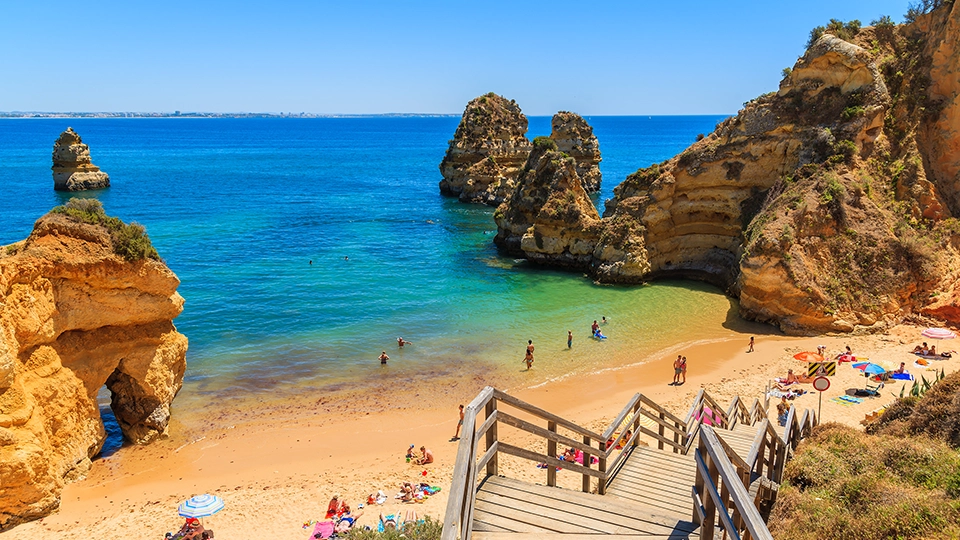
Algarve
The Algarve region is a popular destination for expats. Known primarily for its beautiful beaches and mild weather during the summer, Portugal’s southern region is a popular vacation spot for locals and visitors alike. Indeed, many news outlets around the world have written about how wonderful life is in the Algarve.
According to official statistics, a total of 23.6% of Algarve inhabitants are foreigners. Property prices are not very high, at least in comparison to other western Europe regions; an apartment in Albufeira can start from €100,000 euros, and you can buy a beautiful villa starting from €300,000 euros.
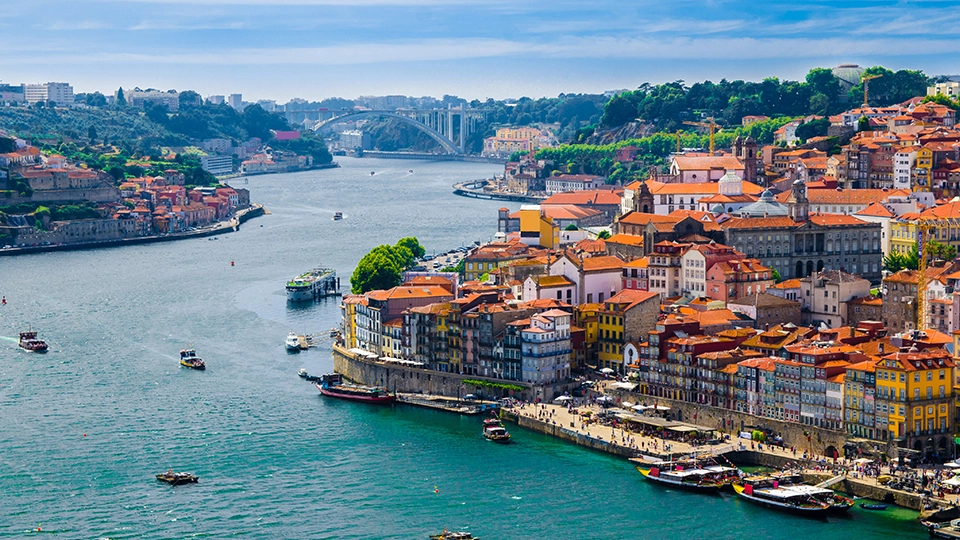
Porto
Porto is the second largest city in the country after its capital Lisbon. It has rich cultural and ethnic diversity. More than 52,655 foreign nationals call the Porto Metropolitan Area their home. The Ribeira neighbourhood near the river is a popular destination with its historic buildings and lively bars and restaurants. But it can feel a bit gimmicky, and accommodations tend to fill up well in advance. Aliados, a neighbourhood just up the hill from Ribeira, is a great place to stay and eat in the city’s centre.
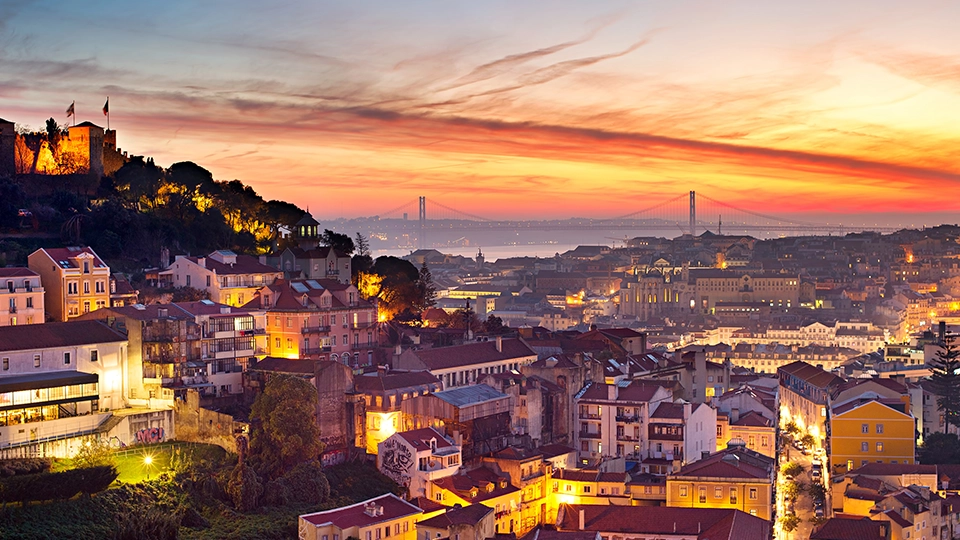
Lisbon
Lisbon, Portugal’s capital, has a long and rich history. After Athens, it’s Europe’s second-oldest capital city. Chiado, the town’s commercial centre, was destroyed by a massive earthquake in 1755 and rebuilt in a classical style with wide boulevards and mosaic cobblestone streets in the classical style.
In Lisbon, the average monthly payment is €1,265 for a property located in the city centre and €850 in other areas. If you would like to buy property in Lisbon, the areas of Alcantara, Santa Barbara and Alfama in the historical centre are hotspots that you should check out before moving forward with any purchase.
Finding a job in Portugal
If you are looking for work in Portugal and are an expat, the most competitive employment markets are in the tourist and hospitality industry, start-ups, and contact centres. If you are a native English speaker, you already have a significant edge in this area because several of these occupations need a high degree of English language proficiency.
Being able to speak two or three languages is beneficial in its own right. Google, Amazon, Uber, and many other significant international companies have offices in Portugal, amongst others. It would be to your advantage to speak English as well as other European languages in order to be considered for these professions in Portugal. An accredited college or university degree will often be necessary to work for any of these companies.
The minimum wage in Portugal is now fixed at €700 per month based on 12 payments per year, or €580 based on 14 payments. This is significantly lower than the minimum wage in the majority of other EU countries.
Visas and residency permits in Portugal
If you would like to move and work or study in Portugal, there is a broad range of work and residency visa options that you could use. Portugal’s Golden Visa is an ideal option for non-EU nationals that would like to live in the bloc, thus securing the future of their families.
Golden Visa
The Portugal Golden Visa programme started in 2012 with the intention of helping the country’s economy with investment funds coming from abroad and into Portugal. It is a residency by investment programme for people who are not citizens of the EU that lasts for five years and grants them the ability to work, study, and reside in Portugal while also allowing them to move freely within the Schengen area of Europe. In year 6, a Portuguese passport can be obtained – the 4th most powerful passport in the world.
Portugal’s Golden Visa programme has helped hundreds of families to move to Portugal and the EU, where they can now take advantage of the country’s high standard of living and diverse cultural offerings. British citizens can also take advantage of the programme, thanks to Brexit.
The Golden Visa grants a temporary residency visa permit for two years. After two years, you can renew the visa for another two years.
After five years, residents can then apply for Portuguese citizenship. This allows foreign investors to obtain a Portuguese passport.
Find out moreLong-term work visa
Applying for a long-term work visa is necessary if you are a non-EU national planning to work in Portugal for more than six months. The work visa is in the form of a long-term Schengen Visa, which grants its holders the ability to travel freely within all 27 countries that are part of the Schengen area.
It is important to note that in order for a citizen of one Schengen member to find a job in another of the bloc’s countries, they will need to go through a local process, which can vary depending on which country they choose to work in.
D7 Visa
One of the most sought-after visas by expatriates is Portugal’s D7 visa. To be eligible for a D7 visa, foreign nationals must demonstrate a periodic passive income or the ability to support themselves in Portugal financially. The D7 visa is also known as the “visa for pensioners” or the “income visa” by certain expats.
For more information, you can read our Portuguese D7 Visa blog.
Short-term work visa
A work visa for short-term employment is necessary for temporary contracts that are fewer than six months in length. If you are participating in highly qualified professional activities, academic teaching, or scientific research, you may be eligible for an extension of your temporary stay visa for up to one additional year.
Self-employed workers’ permit
Foreign nationals who are not citizens of an EU country and want to establish their own company in Portugal must go through the same steps as regular employees to obtain a resident visa. However, the authorities will demand additional documentation establishing your firm’s actions.
Cost of living in Portugal
The cost of living in Portugal is low compared to other countries in the EU such as France, the Netherlands and Germany. Therefore, if you would like to live in Portugal, you don’t need a large salary. The most expensive city in Portugal is the capital Lisbon, followed by Porto and Cascais. Of course, the Portuguese economy faces the same challenges as every other European economy such as high inflation and energy costs that may put a strain on your budget.
Residents of Portugal have access to a favourable tax system. Becoming a non-habitual resident (NHR) also means you benefit from tax breaks and exemptions. Please visit our website’s dedicated section for more information on Portugal’s tax bands and tax benefits.


How to open a Portuguese bank account
Living as an expat in Portugal could become easier if you open a Portuguese bank account. If you open one, it will be easier to pay taxes in Portugal, get paid by a Portuguese company, and establish permanent residency. There are many options regarding banks ranging from international to regional and online only. Therefore, you won’t have a problem identifying which one is best for you based on services and charges.
Non-residents and residents alike can open a bank account in Portugal. A non-resident account requires more verification and may have more restrictions than a resident account; however, this is an option if you don’t yet have an address in Portugal.
Documents needed to open a Portuguese bank account
Opening a bank account in Portugal requires your NIF, so we recommend getting your Portuguese NIF number, or “Numero de Identificaço Fiscal” (NIF) number, first. This document, issued by the Portuguese tax administration, is a necessity for anyone moving to Portugal. In order to pay taxes, get a phone contract, and create a bank account, you will need this number. Bring a copy of your passport and a government-issued photo ID to your local tax office to obtain your NIF number.
Before going to the local bank branch make sure you have the following:
- Valid photo ID or passport
- Proof of address (utility bill)
- Proof of employment (pay slip or work contract)
- NIF number
*Non-residents should have with them proof of their foreign address.
The majority of Portuguese banks require you to open a bank account in person, though some allow you to do so online.
If your account has one, fill out some paperwork and make the minimum deposit. Many banks will let you leave with your debit card in hand. Others will send you a card by mail.
Ready to speak to a specialist?
Book a consultationDriving licenses in Portugal
Negotiations between the British and Portuguese authorities regarding the recognition of UK driving licences are ongoing. In Portugal, you cannot renew or replace your British driving licence. You’ll need to get a Portuguese driver’s licence instead of your current one. We should note that you can’t use an International Driving Permit (IDP) instead of exchanging your licence.
If you live in Portugal, exchange your UK driving licence for a Portugueseone via the IMT online portal by Dec. 31, 2023. If you don’t immediately exchange your licence, register it with the IMT online. You must do this within 60 days of your residence certificate’s issuing date or immediately if you’ve been in Portugal longer.
According to gov.uk if you want to exchange your UK driving licence for a Portuguese one you will need to do the following:
- Go to the IMT portal
- Select the second option: “Driving licences issued by countries: that Portugal has a bilateral agreement or a reciprocity recognition for the recognition and Exchange of driving licences contracting parts of international traffic conventions”
- Fill out the form and submit the necessary documents
When you exchange your driving licence, you will be issued with a ‘guia’ (temporary driver’s permit) which you can use to drive until your new licence arrives.
Education in Portugal
From the ages of three to five, pre-primary education is available in both state-run and private kindergartens. There is no cost to attend a state-run kindergarten. Jardins de Infância is how kindergartens are called in Portuguese. The Foreign Baccalaureate (IB) is international schools’ most common pre-primary curriculum.
Education is free and compulsory in Portugal until the age of eighteen.
Basic Education
Primary and secondary education in Portugal is free and compulsory for all citizens. The 9-year basic education is divided into three cycles:
1st Ciclo: A single teacher is in charge of all of the students in this first cycle, which lasts four years.
2nd Ciclo: This cycle lasts for two years, and a variety of subjects are taught by various teachers.
3rd Ciclo: This cycle lasts for 3 years, and each subject area is taught by a different teacher. This cycle also includes vocational studies. At the end of this cycle, a certificate or diploma is given.
Secondary Education
Secondary education is mandatory in Portugal. This level of education builds upon the knowledge and abilities acquired at the elementary level and further prepares pupils for higher education or the job market. Secondary education lasts three years, and pupils must possess a diploma of elementary school education to be admitted.
What are the best Universities in Portugal?
There are many universities in Portugal that are regarded among the best in the world, and they have rightfully taken their position alongside some of the most prestigious brands in international higher education. Here are three of the best universities in Portugal:
The University of Coimbra was founded in 1290 and is Portugal’s oldest university. With a student population of approximately 24,800 and a ranking of 455 in the QS World University Rankings, the university has a sizable proportion of international students and teaches across eight faculties, covering STEM subjects as well as arts and humanities.
The University of Porto is a public university in Porto that ranked joint 295th in the QS World University Rankings®. It was founded in 1911 and has a large student body of over 31,000 students, including approximately 3,280 international students. The Institute of Molecular and Cell Biology, the Institute of Molecular Pathology and Immunology, and the Research Institute of Computer Systems are three of the school’s most well-known research institutes.
There are around 47,000 students enrolled in 18 faculties at the University of Lisbon, Portugal’s largest university. In 2013, the University of Lisbon (UL) and the previous Technical University of Lisbon (UTL) merged, creating a new university in Lisbon. There are three subjects in which the institution ranks in the top 100 of the QS World University Rankings by Subject: art and design; mining engineering; and geographic information systems.
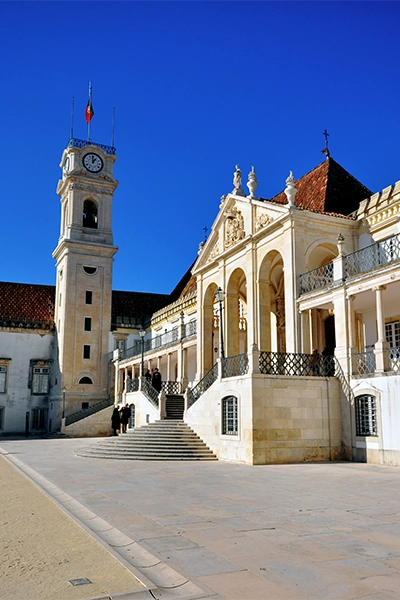
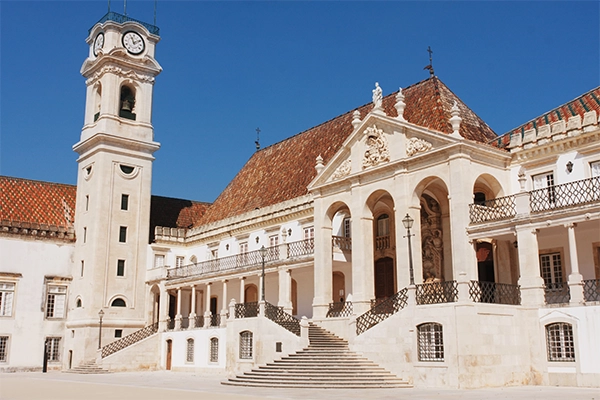
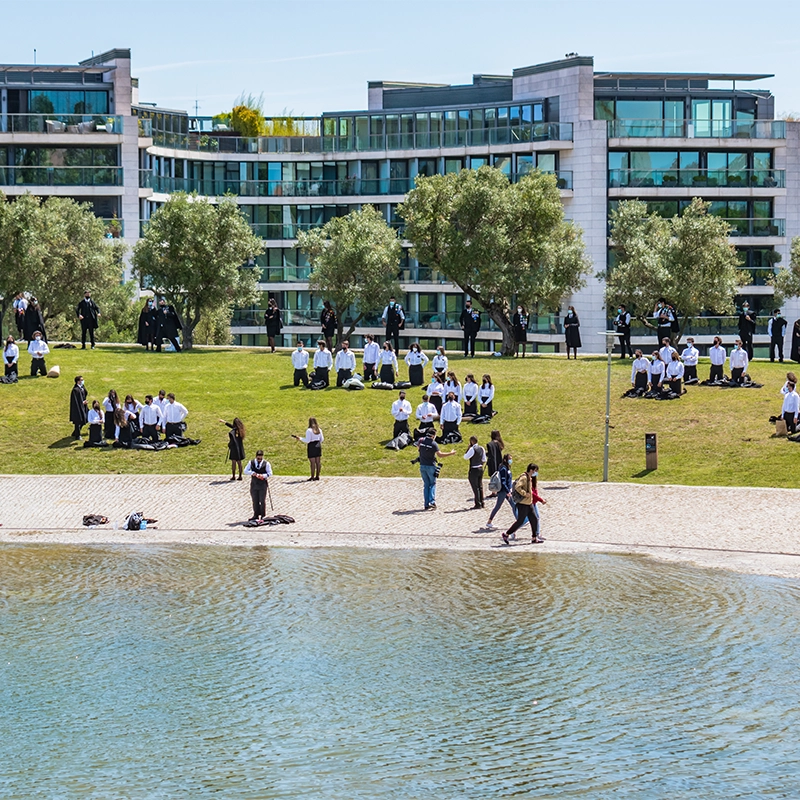
Study Visa in Portugal
There are many universities in Portugal that are regarded among the best in the world, Visas are not required for international students from the EU/EEA or Switzerland to enter Portugal. If you don’t belong to any of these groups, you can submit an application for a student visa at the Portuguese embassy or consulate in your area. The student visa will be valid for the duration of your studies.
These are the docs that you will need for the student visa application:
- Application form
- Acceptance letter from a Portuguese university
- Three passport-size photographs
- Health insurance certificate
- Medical records including vaccinations
- Criminal records: A certificate that you have never been found guilty or sentenced for a crime of any felony
- Proof of Accommodation in Portugal: Can be a letter from the university if availed university accommodation; or a statement from the owner of the apartment/flat.
- Evidence of sufficient funds upon arrival in Portugal such as a bank statement
- Educational documents: Certificates and degrees earned; must be certified by the local Portuguese Embassy/Consulate
Healthcare and Insurance in Portugal
Subsidised state healthcare is generally available for foreigners living or working in Portugal. Portugal’s healthcare system includes both public and private options, and the quality of care provided is to a high degree.
The healthcare system in Portugal is among the best in the world. To be more specific, the 2018 Euro Health Consumer Index placed the Portuguese healthcare system at number 13.
The Portuguese healthcare system includes the country’s NHS or Servicio Nacional de Saude, known as SNS in Portuguese; private health insurance and healthcare subsystems related to professions.
If you are an expat and legal resident of Portugal, you have access to healthcare in Portugal. Certain non-working residents may be included in this category, such as those who are out of the workforce, retired, or reliant on others.
For a period of up to 90 days, EU individuals with a valid European Health Insurance Card (EHIC) or similar can access the Portuguese public healthcare system free of charge. If they want to use the system again, they’ll have to be officially registered as legal residents.
Reciprocal healthcare agreements are available to citizens of various countries in the European Economic Area (EEA). The Global Health Insurance Card (GHIC), which replaced the European Health Insurance Card (EHIC) for UK nationals following Brexit, can be used by UK citizens.
Non-EU citizens will have a harder time getting access to public healthcare in Portugal because they can only use the public health system once they have a job in the country and have paid social security.
Ready to begin your
residency journey?
Book a consultation
Culture and Traditions in Portugal
It is possible to feel Portugal’s rich past in each and every one of its cities, from its bustling capital to its tiny, picture-perfect villages. Portugal is a fascinating country with a deeply-interesting history.
The population of Portugal is 10.21 million, and it is possible to drive from the north to the south of the nation in fewer than eight hours. Portugal is a relatively small country, both in terms of the size of its geographical area and the number of its people. Madeira is also a Portuguese island, and they celebrate the flower festival every year (usually in May), which is an amazing sight to behold!
The Portuguese will not allow something as “insignificant” as work to prevent them from having a coffee break or two throughout the course of the day. Their go-to beverage is a speedy bica that’s about the size of an espresso and comes in a little cup.

People in Portugal love reading books. Livraria Bertrand, which can be found in Chiado and was established in 1732, has the Guinness world record for being the world’s oldest bookstore that is still in business. The Bertrand, which has a history dating back more than 250 years and was initially a tiny business owned by Peter Faure, was formerly a popular gathering place for Portuguese intellectuals across the decades.
If you google Portugal, Fado is one of the first words you will get as a result. Fado, which literally translates to “fate” in Portuguese, is a style of music that was born in the city of Lisbon sometime around 1820. Fado is a form of sorrowful and moving folk music traditionally sung by members of Portugal’s working class and handed down orally from generation to generation. In 2011, UNESCO included the musical style in their Intangible Cultural Heritage of the World list.
Portugal is a Catholic country. Catholic Christians frequently make the journey to the holy site of Fátima to pay their respects to the Virgin Mary. During the year 1917, it was reported that the Virgin Mary had an appearance in this location to three young shepherds. It is second only to Rome in Europe in terms of the number of pilgrims that visit each year.
Learning Portuguese
Learning the local language can be a great advantage when living abroad, making your everyday life easier. More than 250 million people speak Portuguese. Another perk of learning Portuguese is that you can visit countries such as Brazil, Mozambique, Angola, Guinea-Bissau and others and communicate with the locals in their mother tongue.
If English is your first language, and you want to learn a second language, you can probably learn either Portuguese or Spanish with the same effort.
If you are already fluent in Spanish, studying Portuguese will be a lot easier than it was for you to learn Spanish at the beginning. This is due to the near-perfect lexical resemblance between the two languages.
Duolingo and other online courses are good options if you want to learn the Portuguese language fundamentals. If you want to learn even more, you can try local language schools and centres such as Linguas & Linguas, CIAL, CESA in Lisbon or Royal School of Languages and CEL in Porto. You could also find a personal teacher who could help you develop conversational skills faster.
Moving to Portugal with Holborn
The Golden Visa programme in Portugal is the least complicated way to obtain an EU passport and is continuously ranked as one of the world’s top Citizenship by Investment programmes. The programme has been running successfully for many years. The Portuguese Golden Visa programme can provide immediate permanent residency, as well as a clear five-year path to full citizenship and an EU passport for Portugal.
Holborn Pass offers a tailored service that assists our customers in acquiring residency and citizenship in a variety of countries across the world. You may have peace of mind knowing that you are in good hands with our team of specialists because they work with some of the most reliable investing programmes in the world. If you are interested in moving to Portugal or investing in a Portuguese Golden Visa, please get in touch with our team of fully qualified experts that can design a suitable plan for you.
Book a consultationFrequently asked questions
The minimum investment amount for the Portuguese Golden Visa is €500,000.
There is also a donation option available of €250,000. This donation must be made into artistic production or in the recovery or maintenance of national cultural heritage, arts or culture.
Be aware that other costs such as government application fees and legal processing fees also apply. One of our specialists will discuss this with you in more detail, so you are aware of all costs upfront.
No. You do not have to live permanently in Portugal to renew your Portugal Golden Visa or receive permanent residence or citizenship.
The minimum stay requirements for the Portugal Golden Visa are that you must stay in the country for at least seven days in the first year. You must remain in the country for 14 days for the following two-year period. Over the course of five years, this works out to five weeks in Portugal to get your permanent residence permit.
The initial Portuguese Golden Visa grants temporary residence for two years after the initial application. You can renew your temporary residence visa for two successive periods of two years at a time, as long as you continue to meet the requirements.
Obtaining a Golden Visa and citizenship in Portugal takes approximately five years.
The requirements for the Golden Visa are quite simple:
- You and your immediate family have a clean criminal record
- You aren’t currently a citizen of an EU country (this applies if you are from the United Kingdom following Brexit, meaning UK citizens can apply for Portugal citizenship by investment program.)
- You have the required investment amount – the amount will change depending on the type of investment you choose.
- As long as you meet the criteria above, we can start your application.
Holborn Assets are an award-winning wealth management and financial services business established in 1998. With offices globally, Holborn are well-positioned to help you with your citizenship and residency application.
At Holborn we have:
- 250+ qualified advisors across the globe
- More than $2billion assets under management
- Servicing 20,000 clients worldwide
Ready to begin your
residency journey?
Book a consultation
Reviews of Holborn Assets
You may also be interested in
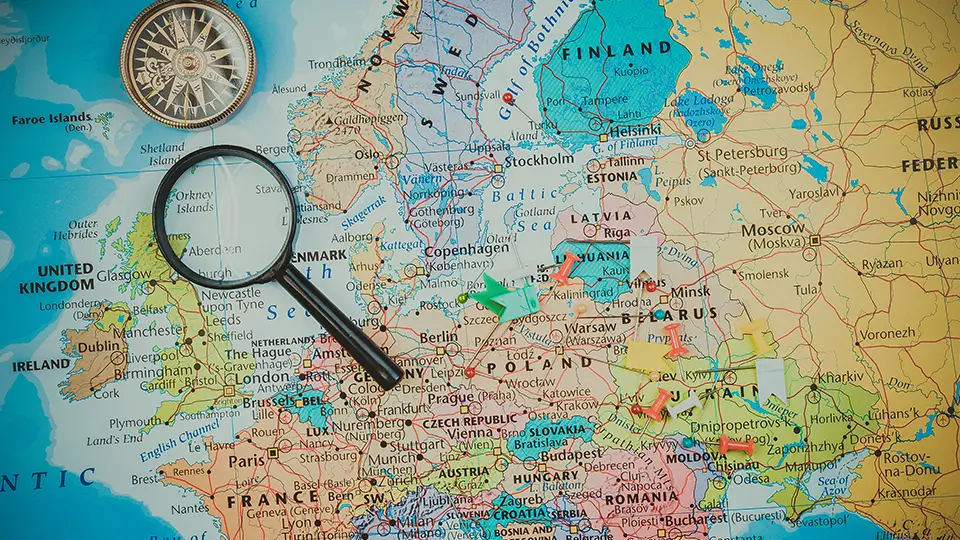
Unlock Europe for Less: Discover the Cheapest Golden Visas Programmes
Here are two things you need to know about European golden visas. First, they are some of the most sought-after in the world, and second, there is a lot to choose from. In fact, there are more than...
Read more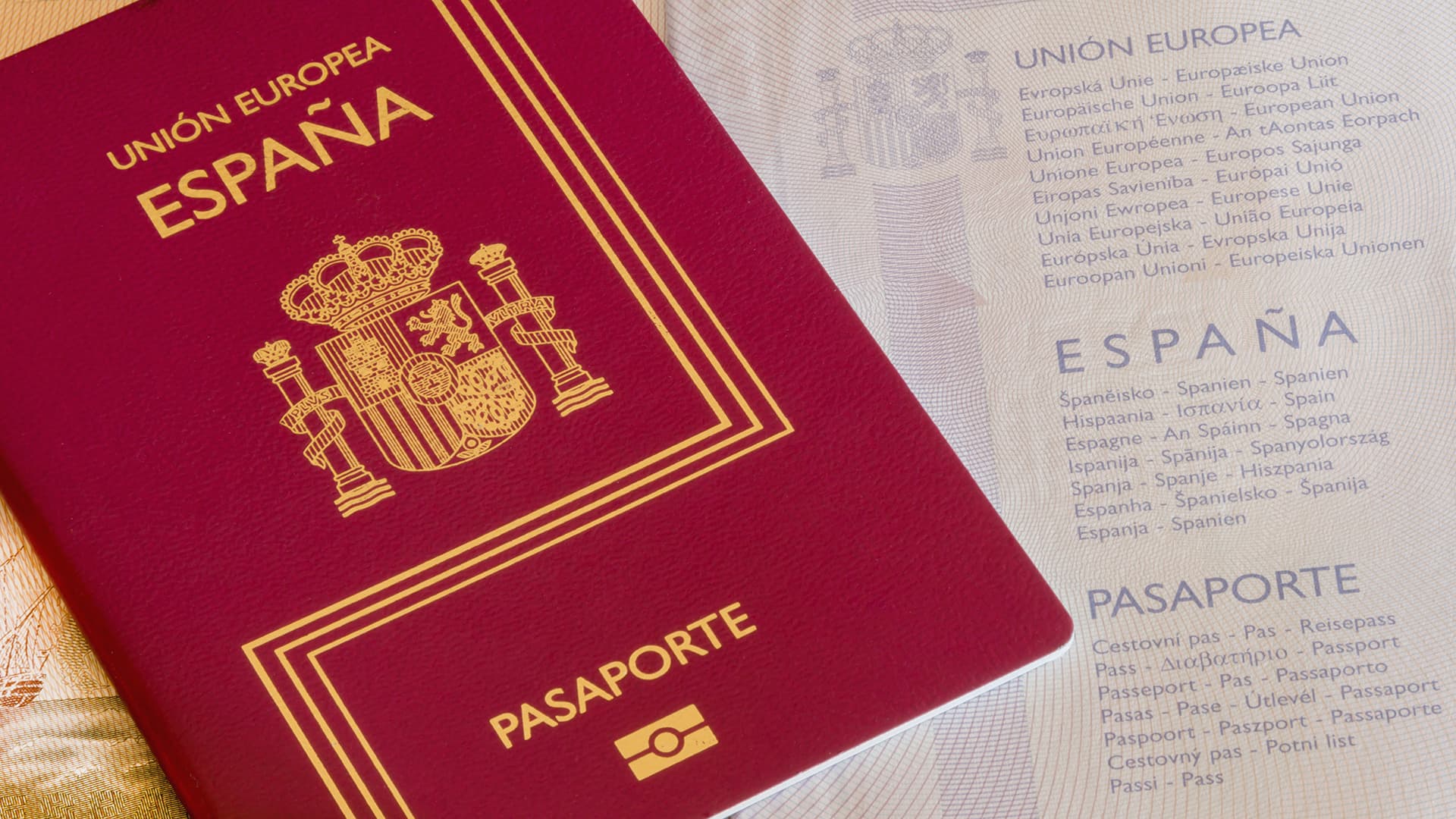
Fast-track Spanish Citizenship with the Spain Golden Visa
The Spain Golden Visa is one of Europe’s most highly prized investor visas, and for good reason. It allows investors and their families to live, work and study in Spain. It also grants access...
Read more
The future of the Portugal Golden Visa explained
The fate of the Portugal Golden Visa has been up in the air since sweeping changes were announced by Prime Minister António Costa in February 2016. The aim was to tackle the country’s...
Read more
The UAE Golden Visa in 2023
Since 1980, the population in the UAE has increased by 164% from 1.01 million to 10.17 million in 2023. The huge increase is largely driven by expats. According to the latest statistics, expats make...
Read more